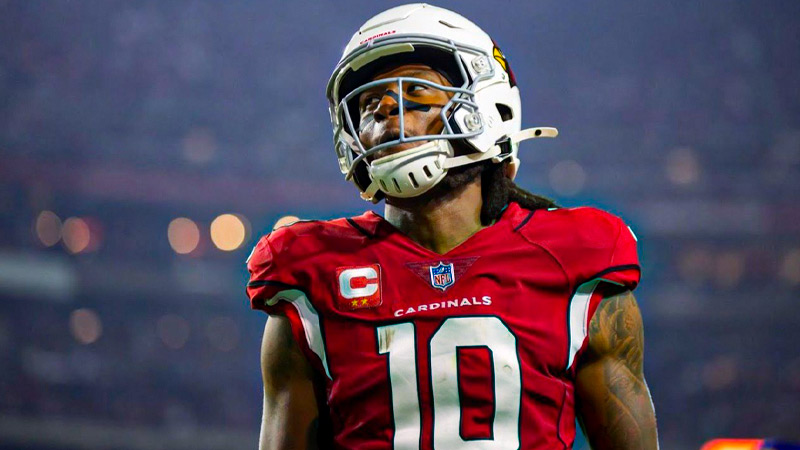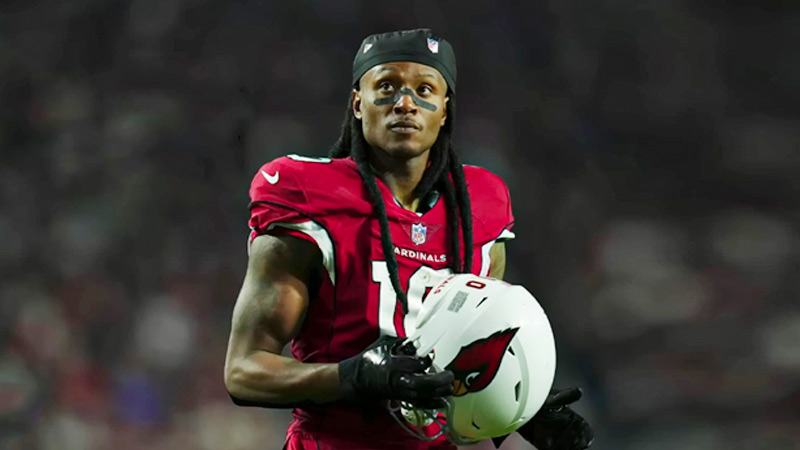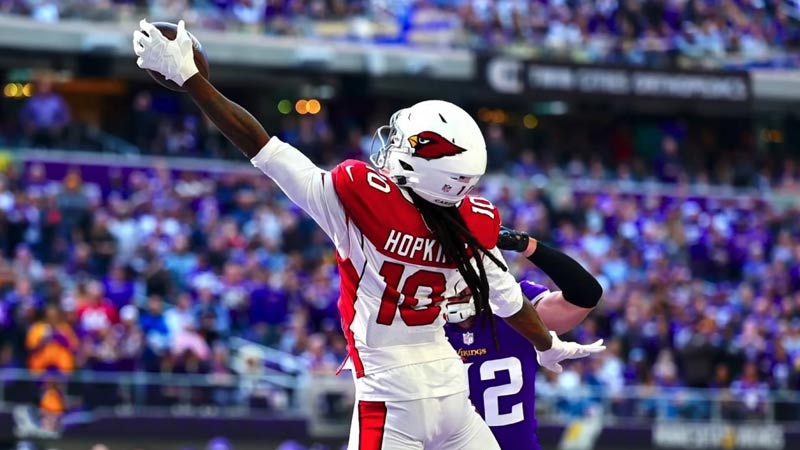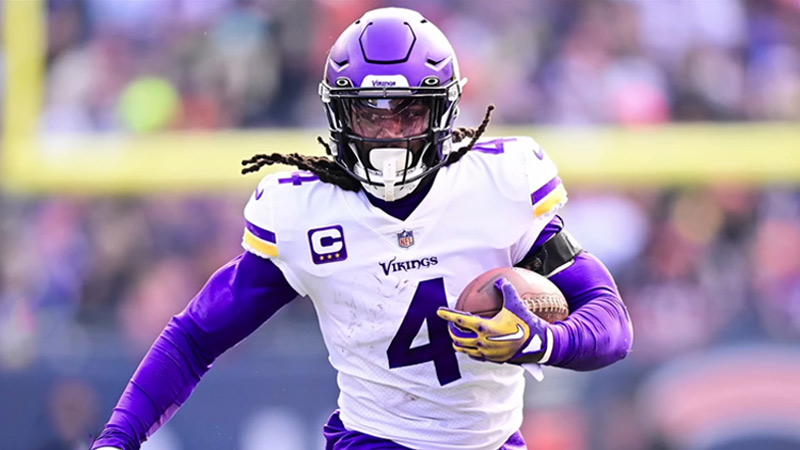The suspension of star wide receiver DeAndre Hopkins sent shockwaves through the NFL, raising eyebrows and sparking discussions about the league’s stringent drug policies.
In a stunning turn of events, Hopkins, known for his exceptional athleticism and playmaking prowess, was sidelined for the first six games of the 2022 season.
The catalyst behind this suspension was a positive test for Ostarine, a banned substance, detected during a routine drug test in November.
As the NFL’s policies on performance-enhancing drugs took center stage, Hopkins’ case brought to light, nuanced questions about the fairness and implications of these regulations in professional football.
Who Is Deandre Hopkins?
DeAndre Hopkins is a professional American football wide receiver who played in the National Football League (NFL).
Born on June 6, 1992, in Central, South Carolina, Hopkins is widely regarded as one of the top wide receivers in the league.
Key points about DeAndre Hopkins:
College Career
Hopkins played college football at Clemson University. He had a standout career with the Clemson Tigers, earning All-American honors and setting multiple school records for receiving.
NFL Draft
DeAndre Hopkins entered the NFL Draft in 2013 and was selected by the Houston Texans in the first round as the 27th overall pick. He quickly established himself as a premier wide receiver in the league.
Houston Texans
Hopkins spent the majority of his early career with the Houston Texans. During his tenure with the Texans, he became known for his exceptional catching ability, route running, and playmaking skills.
Pro Bowl and All-Pro Recognition
Hopkins earned numerous Pro Bowl selections and All-Pro honors for his outstanding performances. His consistency and ability to make contested catches in critical situations set him apart in the NFL.
Trade to Arizona Cardinals
In March 2020, Hopkins was involved in a high-profile trade that sent him from the Houston Texans to the Arizona Cardinals. The trade involved a swap of draft picks and other players.
Arizona Cardinals
In Arizona, Hopkins excelled as a critical target for the Cardinals’ quarterback, Kyler Murray. His presence significantly impacted the team’s offensive capabilities.
Personal Achievements
Hopkins has accumulated impressive statistics throughout his career, including multiple seasons with over 1,000 receiving yards. He is known for making acrobatic catches and being a reliable target for his quarterbacks.
Why Was DeAndre Hopkins Suspended?

DeAndre Hopkins was suspended for six games at the beginning of the 2022 NFL season for violating the league’s performance-enhancing drugs (PEDs) policies.
Here are the key points:
Positive Ostarine Test
In a routine drug test conducted in November, Hopkins tested positive for traces of Ostarine, a banned substance under the NFL’s anti-doping regulations.
Ostarine as a Banned Substance
Ostarine is classified as a selective androgen receptor modulator (SARM) and is prohibited in the NFL due to its potential to enhance athletic performance.
Exceeding Threshold
The concentration of oxarine detected in Hopkins’s test exceeded the NFL’s permissible threshold, registering at 0.134% where the limit is set at 0.1%.
Official Announcement in May 2022
The NFL officially announced Hopkins’ suspension in May 2022, rendering him ineligible for the first six games of the 2022 season.
Contamination Claim by Hopkins
Hopkins maintained that the detected substance was a contaminant and not knowingly ingested as a performance-enhancing drug.
Appeal Consideration and Withdrawal
Initially contemplating an appeal, Hopkins withdrew it, ultimately accepting the six-game suspension.
Preseason Participation
Despite the looming suspension for the regular season, Hopkins was permitted to participate in all preseason practices and games.
Facility Restriction Until Game 6
Part of the suspension conditions included Hopkins being unable to be present at team facilities until reinstated following the Cardinals’ sixth regular-season game.
What Is Ostarine, and Why Is It Banned in the NFL?

Ostarine, also known by its chemical name MK-2866, is a type of selective androgen receptor modulator (SARM).
It is designed to stimulate the androgen receptors in the body, particularly those in muscle tissue, to promote muscle growth and prevent muscle wasting.
The main reasons Ostarine is banned in the NFL and other sports organizations include:
Performance Enhancement
Ostarine is believed to have performance-enhancing properties by promoting muscle development and potentially improving athletic performance. Athletes may use it to gain a competitive advantage, which goes against the principles of fair play.
Health Risks
While SARMs like Ostarine are still under research for potential medical applications, their safety and long-term effects are not fully understood. The use of substances with uncertain health implications poses risks to athletes’ well-being.
Violation of Anti-Doping Policies
Like many other sports organizations, the NFL maintains strict anti-doping policies to ensure fair competition and the integrity of the game. The use of banned substances, including Ostarine, is considered a violation of these policies.
Unapproved Use
Ostarine is not approved for human use by the U.S. Food and Drug Administration (FDA). Athletes must adhere to regulations prohibiting using substances not approved for medical purposes.
Leveling the Playing Field
Banning substances like Ostarine helps maintain a level playing field among athletes.
Prohibiting certain performance-enhancing substances ensures that success is based on skill, training, and natural abilities rather than using artificial aids.
What Impact Did Deandre Hopkins’ Suspension Have on the Arizona Cardinals?

DeAndre Hopkins’ suspension notably impacted the Arizona Cardinals, particularly their offensive dynamics.
Here are some key points outlining the effects:
Strain on Offensive Performance
Hopkins’ absence created a void in the Cardinals’ receiving corps, putting additional pressure on other wide receivers and impacting the offensive performance.
Reduced Offensive Options
Without Hopkins, the Cardinals had fewer options in the passing game, affecting their ability to stretch defenses and create diverse offensive strategies.
Challenges for Quarterback Connection
Quarterback Kyler Murray, accustomed to relying on Hopkins as a primary target, faced challenges in building the same level of chemistry with other receivers during Hopkins’ suspension.
Struggles in the Passing Game
The Cardinals experienced difficulties replicating the efficiency and effectiveness of their passing game without Hopkins, leading to challenges in moving the ball down the field.
Impact on Team Strategy
The absence of Hopkins likely prompted adjustments in the Cardinals’ offensive game plan, with coaches having to adapt to the personnel available during his suspension.
Return as a Boost
Hopkins’ return to the lineup after serving his suspension significantly boosted the team. His playmaking abilities, experience, and chemistry with Murray were crucial components that enhanced the Cardinals’ offensive capabilities.
Offensive Resurgence upon Return
In his first game after the suspension, Hopkins made a strong impact, recording impressive statistics (10 catches for 103 yards), signaling a resurgence in the Cardinals’ passing game.
How Did Deandre Hopkins Perform Upon His Return to the Arizona Cardinals After the Suspension?
Upon returning to the Arizona Cardinals after the suspension, DeAndre Hopkins delivered a standout performance, showcasing his exceptional skills and significantly impacting the team’s offensive capabilities.
Here are the highlights of his performance:
Impressive Receiving Statistics
In his first game back, Hopkins recorded 10 catches for 103 yards. His ability to consistently contribute in the passing game was evident.
Playmaking Ability on Display
Hopkins demonstrated his exceptional playmaking skills, making crucial receptions that contributed to the Cardinals’ offensive success.
Key Contributor in Victory
His performance was pivotal in the Cardinals’ 42-34 win over the New Orleans Saints, underlining his importance as a critical contributor to the team’s success.
Boost to Struggling Offense
The return of Hopkins provided a much-needed boost to the Cardinals’ struggling offense. His presence on the field added depth and effectiveness to the passing game.
Positive Impact Acknowledged by Coach
Cardinals coach Kliff Kingsbury emphasized the impact of having a dynamic player like Hopkins, stating that it makes a difference in offensive schemes, play-calling, and overall team performance.
FAQs
What happened to DeAndre Hopkins?
DeAndre Hopkins was suspended for six games in the 2022 NFL season for violating the league’s performance-enhancing drug policy due to traces of Ostarine found in a drug test.
What substance led to Hopkins’ suspension?
His suspension was a result of traces of Ostarine, a banned substance, found in a November drug test.
Did Hopkins appeal the suspension?
Yes, Hopkins initially appealed the suspension but later withdrew the appeal.
How long was Hopkins suspended, and what were the conditions for his return?
Hopkins received a six-game suspension and could not be at team facilities until restored to the active roster after the Cardinals’ sixth regular-season game.
How did Hopkins address concerns about the substance being a contaminant?
Hopkins consistently maintained that the detected substance, Ostarine, was a contaminant and not knowingly taken. He expressed frustration with the NFL’s “black and white” policy on banned substances.
To Recap
DeAndre Hopkins’ suspension unfolded as a compelling narrative within the NFL’s complex web of drug policies.
The six-game hiatus, triggered by traces of Ostarine, showcased the league’s unwavering stance on performance-enhancing substances.
While Hopkins maintained the substance’s presence was unintentional, the decision to withdraw his appeal signaled acceptance of the suspension.
His return marked a pivotal moment for the Arizona Cardinals and reignited discussions about the fairness and adaptability of the NFL’s anti-doping protocols.
As the season progressed, Hopkins’ journey became a testament to the challenges athletes face navigating the intricate landscape of drug regulations in professional sports.







